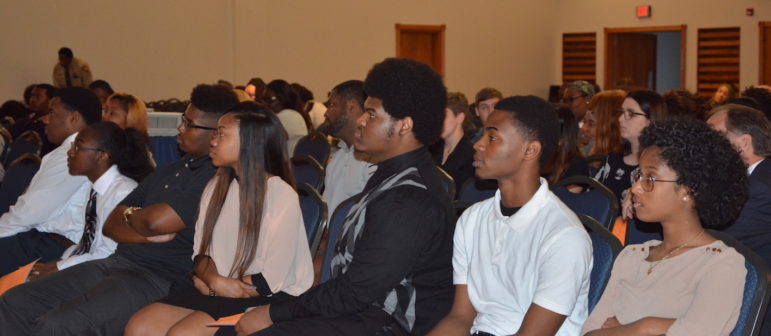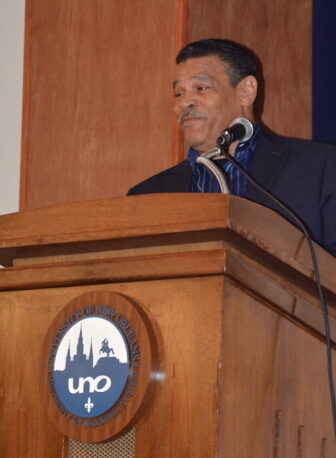
It happened on a recent Saturday, three days ahead of the 49th anniversary of the Rev. Dr. Martin Luther King Jr.’s assassination, and it happened in the presence of one of the iconic figures of the Civil Rights movement, Ambassador Andrew Young.
Months in the making, a process of organizing and discussion culminated in a convening of 200 student leaders committed to creating a passion for faithful citizenship and engagement.
They gathered at the University of New Orleans, and, in addition to UNO, they represented universities and high school from all across the city: Southern University at New Orleans, Dillard, Loyola, Tulane and Xavier universities as well as New Orleans Baptist Theological Seminary and St. Augustine, Ben Franklin and Lake Area high schools.
Meeting with the ambassador, a New Orleans native, was an honor for the delegates, and for Young the occasion was tinged with strong memories. Back in the day, barely out of college himself, Young led numerous marches and actions before and after the murder of King, his colleague and close confidant. He went on to serve as a Georgia congressman, U.S. Ambassador to the United Nations under President Jimmy Carter and mayor of Atlanta (twice).
The delegates were demonstrating their own leadership by coming together to identify and focus on local, state and national issues affecting them as students and young adult citizens of our city, state and nation.
Supported by enlightened faculty and officials, during the months-long run-up to the convening, the delegates conducted “student listening campaigns” — one-on-one conversations among their peers — to identify topics of mutual concern and to recruit participants.
One goal of the day-long convening was the formation of a citywide student collaborative reminiscent of the student nonviolent movement of the 1960s. Among issues of concern surfaced by the listening campaigns were public safety, police/student relations, criminal justice reform and homelessness. Sound familiar?
But if the convening touched on classic civil rights themes, the issues addressed were also timely. As I write this, conversations about state support for higher education and student tuition assistance are being echoed in the state Legislature, which gathered for its annual session days later. And of course, the students were mindful of the reactionary and deeply disturbing noises coming out of Washington in these early days of the Trump administration.
Rather than give way to despair or feelings of powerlessness, the student leaders engaged in lively discussion. The youthful frustration that breeds cynicism was notably lacking.
Another measure of student commitment was the delegates’ unflagging participation in conversations and discourse that began at 7:30 on a sunny Saturday amid the temptations of spring break and a weekend festival. And many signed on to conduct follow-up meetings with local and state officials about public safety and support for higher education and TOPS, the state’s endangered college scholarship program. They also committed to create a strong voter education and registration drive on all city campuses ahead of this fall’s elections and the 2018 midterms.
In my view, the convening was historic. To those who might disagree, I’ll point out some interesting parallels, because New Orleans has played host to history like this in the past. In February 1957, one month after 60 people gathered at Atlanta’s Ebeneezer Baptist Church to form the Southern Leadership Conference on Transportation and Nonviolent Integration, a similar meeting at New Zion Baptist Church in New Orleans resulted in formation of the Southern Leadership Conference. In August of that year it became the Southern Christian Leadership Conference, the SCLC.
Joining King as officers of the new organization were the Rev. T.J. Jemison of Baton Rouge and New Orleans attorney Israel Augustine.
Three years later, in April of 1960, 300 students, organized by King and the SCLC’s Ella Baker, attended the Southwide Student Leadership Conference on Nonviolent Resistance to Segregation — the seed of what soon became the Student Nonviolent Coordinating Committee, led later in the 1960s by major figures in the Civil Rights movement, including John Lewis, today a congressman from Georgia, and the fiery Stokely Carmichael.
Students had already emerged as an integral part of the struggle for social and civil rights. The four valiant and courageous souls who staged the watershed cafeteria sit-in at a Greensboro, NC, Woolworth’s were students, as were so many of those who soldiered on in the pivotal sit-ins and freedom rides throughout the decade.
But are these moments in a history that’s over and done? Can today’s young people be of significance in the larger scheme of events buffeting an increasingly globalized planet?
The front pages of our nation’s newspapers show the blood-stained pews of churches in Egypt. The headlines scream the latest atrocity in Syria: the use of chemical weapons to poison women and children and other civilians dislodged from their homes in the fight against Islamic terrorists. Closer to home, we see a White House staff riven by internal conflict, ideological flip-flops and incompetence.
Might not all that render a student gathering in New Orleans kind of insignificant?
So don’t listen to those who make light of student citizenship, even — perhaps especially — at a time when we are distracted and sometimes terrified by events competing for our attention.
Out of curiosity I looked back at the news context in which the nascent Civil Rights era was rooted. In 1960, as SNCC first raised its banner, the Cold War had the whole planet in the crosshairs of a thermonuclear Armageddon, and the Soviet Union had shot down an American U2 spy plane. There were already 900 “advisers” on the ground in Vietnam, an early wave in the buildup to a war that would claim nearly 60,000 American lives and many times that number of Vietnamese, civilians and soldiers alike.
Nevertheless, in that same year — a presidential election year, don’t forget — those four students asking for coffee in a Greensboro department store spurred America toward eventual legislation that would end de jure segregation. A month after the Greensboro action, seven students from Southern University sat in at a Kress lunch counter in downtown Baton Rouge, and the movement spread from there.
So don’t listen to those who make light of student citizenship, even — perhaps especially — at a time when we are distracted and sometimes terrified by events competing for our attention. Within a very few years, the young people now furthering their education at our high schools and universities will face the daunting task of sorting out the mess that some of their elders are making of the world right now.
It makes me hugely proud and hopeful to see a generation engaging actively in the world around them and developing the capacity for vigorous and effective participation in a democracy.
Continuity has always been critical to the survival of society and our form of government. Those of us no longer young need to pass on to the next generation the survival kit that, for all our setbacks, has kept the arc of the moral universe bending — as King knew it always would — toward justice. To do less is to betray our responsibility and to betray our children.
There has been much speculation about the direction of our country in a politically perilous world. I believe one peril that receives too little note is our failure to invest in the future empowerment of our children, equipping them to deal with the problems that they’ve inherited from us.
When we don’t acknowledge their efforts to understand, their efforts to speak out, we in fact reinforce their feelings of powerlessness. Whatever comes of it, the recent convening of student leaders was a step forward in a generation’s effort to find its voice and speak out. As elders, we need to join in that effort as coaches and champions of it.
Silence would only demonstrate our indifference. There’s another quotation famously associated with King: “There comes a time when silence is betrayal.”
Joe Givens is director of the Isaiah Institute of New Orleans. He can be reached by email.
The opinion section is a community forum. Views expressed are not necessarily those of The Lens or its staff. To propose an idea for a column, contact Lens founder Karen Gadbois.



